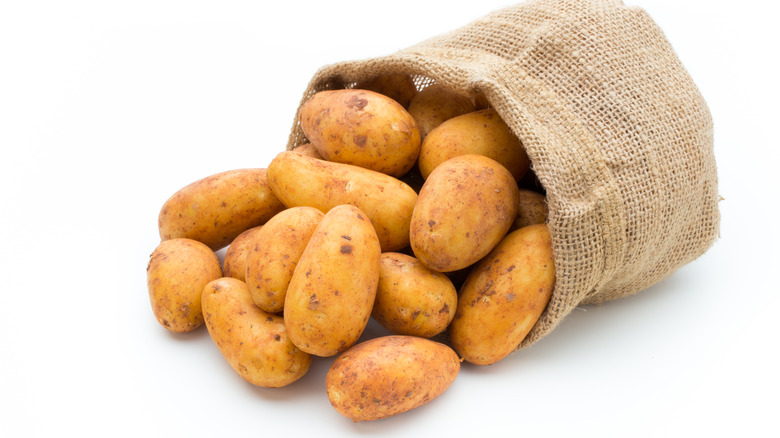This Easy Ingredient Swap Makes Creamier Scalloped Potatoes
Is there a better side dish than scalloped potatoes? Those creamy, cheesy, buttery, starchy vegetables go with practically everything. Besides, the classic dish is fairly simple: sliced potatoes layered in a casserole dish, topped with cream and any additional flavors you desire. It's interesting, though, that sometimes the simplest recipes can be the most difficult to perfect.
The Kitchn, for example, tested scalloped potato recipes from four famous chefs — Tyler Florence, Chrissy Teigen, The Pioneer Woman, and Martha Stewart — and found that all these recipes definitely aren't created equal. Martha Stewart's delicious recipe fared best, by the way.
While it's certainly possible to make scalloped potatoes from whatever variety you have on hand, it turns out that the choice of potato makes a difference. If you've always relied on the red-skinned variety, for example, a simple ingredient swap can have a big impact if you're going for the creamiest potato perfection.
Choose a starchy potato
During The Kitchn's scalloped potato trials, one of the takeaways was that starchy potatoes like Russet or Yukon gold are the best for the dish. Russets came out the creamiest, while Yukon golds remained a bit firmer and held shape better after baking. Southern Living agrees that Russet and Yukon golds are the best varieties for scalloped potatoes, pointing out that red-skinned ones are waxier and may remain too firm after baking.
Once you've selected and thinly sliced your Russet or Yukon gold potatoes, either by hand or with a mandoline, it's important not to rinse the slices, as their natural starch helps thicken your dish to the ideal consistency. One final tip for perfect scalloped potatoes comes from Chef Michael Symon via Food Network. Covering your casserole with aluminum foil helps the potatoes cook through evenly. After about an hour, uncover the dish to brown up the top of your creamy and delicious dinner.

